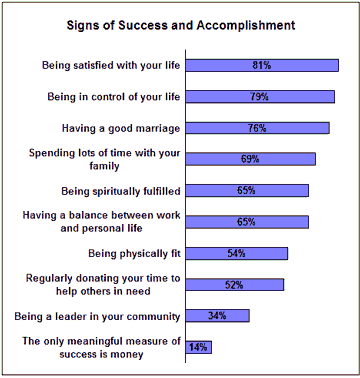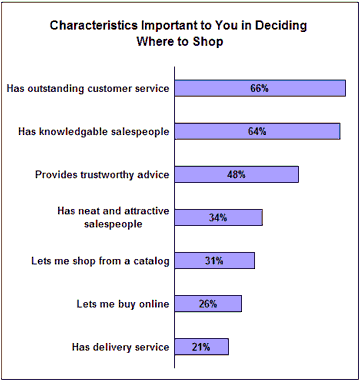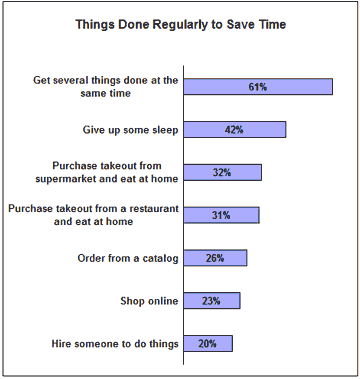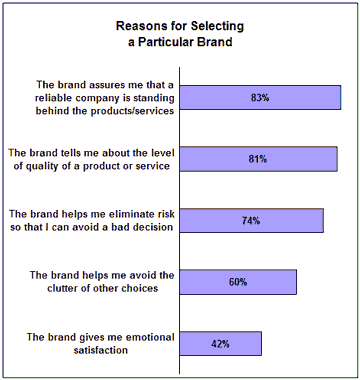|
|
|
Why
They Buy –
Show Me the Money! It's all about making your personal "cash register" ring. You may or may not see how the money actually flows into your business… or the connection to your paycheck… but maintaining and enhancing that money-flow is your most important responsibility. No matter what your job description or title is, you need to become more involved in facilitating sales. Legendary sales trainer Zig Ziglar says: "Nothing happens until a customer buys." Even if you never come nose-to-nose with customer/prospects, the knowledge you'll gain from this article can be applied to making some very smart strategic decisions… that'll increase your company's profitability (and probably your personal compensation too). Another Zig quote: "You can get whatever you want in life, if you help enough other people get what they want!" If you've been reading my business/marketing articles, I'm sure you've noticed a bias. I'm not a huge fan of pure branding as a general strategy. For 99.9% of companies, it's largely a waste of money. Instead, I'm all about accountable marketing. That means only doing things that have a direct, *measurable* result. You may not know this, but the advertising/marketing world is sharply divided between two camps. On one side are the branding-oriented agencies, and on the other, the direct response folks. While there's occasional crossover, the former group is responsible for most of the "pretty" image ads and the "entertaining" commercials on TV. The direct marketers are a different breed. They came up from humble beginnings in "mail order" pulp magazine ads (allow 4 to 6 weeks for delivery…), and more recently, TV infomercials. From these plebian roots, direct marketing (DM) has evolved into a highly sophisticated discipline. By its nature, each DM advertisement, mailing, or campaign, has been a mini-experiment. When you know exactly how much the ad cost and how many sales directly resulted, survivability depends upon the ad's ability to pay its own way. (Good marketers are also good accountants.) This tracking and winnowing process also leads to an interesting phenomenon: marketing evolution. Because good ads live and bad ones die, oft-repeated ad placements and remailed letters are well worth studying. I have a shelf full of books containing successful, long-running ads. Part of the training to become a great direct marketing copywriter is to study, and then write out – in long hand – the words in each ad. Several times. You know the saying, "Practice makes perfect?" It's not true. Only perfect practice makes perfect. By writing out proven high performance ads and letters, you embed them in your marketing DNA. The studying part involves examining the constituent parts of every successful ad or letter, paying particular attention to the headlines, subheads, copy tone, offers, flow, and other critical elements. But fundamentally, success comes from understanding the whys behind the buys. What motivates people to exchange their hard-earned cash for the thing you're selling? The market research firm Yankelovich, Inc. just updated a fascinating survey of consumer attitudes about direct marketing. They did in-depth interviews with 2500 adults during the first five months of 2003. The study provides some remarkable insights into the mind of a customer. For example, one survey question dealt with attitudes about "success and accomplishment." It asked people how they measure personal success. Here, ranked from most to least important, are their answers:
Looking at this list, what one word jumps out at you? Intangibles. I've long believed that the contemporary definition of achievement emphasizes experiences over possessions – self actualization over the trappings of wealth. Material luxuries are no longer so ardently sought (and this shift started well before the dot-bomb market crash of 2000). Note well that the number one sign of success and achievement is "Being satisfied with your life." This and the other top responses clearly point to a shift away from accumulation of more "stuff," and towards the enjoyment of life, health, family, and community. What does this mean for us marketers and businesspeople? How can we convert this knowledge into dollars? Several ways. First, make your customer's "buying event" an interesting and memorable experience… not just another everyday chore. For example, a retailer could have a real "wheel of fortune" in the store. After each customer buys something, offer them a spin of the wheel. One of the spots could be: "Keep what you just bought and we'll give you your money back!" Lesser, but still desirable things could be, "Free box of chocolates" or "20% off your next purchase." A dentist, while not able to make a root canal fun, could do much to reduce patients' stress by offering a cup of green tea in the waiting room, providing noise-blocking headphones playing music of the patient's choosing during the procedure, etc. A web merchant could provide "social proof" of the quality of the things sold by creating customer feedback links or by maintaining a user forum. One of the best examples of this is at my favorite computer hardware webstore: NewEgg.com. I rarely buy anything before first reading the unedited comments about it, good and bad, from other customers. Consider Your Value Proposition. Beyond providing a product or professional/technical service, seek ways to incorporate intangible satisfaction in your total value package. Push those hot buttons. Clearly state how you'll help your customer/client/patient have more free time, achieve better work/life balance, maintain control, etc. Help people envision more good times with family, better health, and feelings of psychological well-being. Deliver legendary service. Understand that merely excellent service is the new baseline. 91% of the people surveyed by Yankelovich agreed with the statement, "The prices I pay entitle me to the highest level of customer service." While this applies irrespective of price point, it's most apparent at the high end. Consumers haven't given up the desire to have nice things. What's happened is that many people have come to take luxury tangible items for granted and no longer recognize any distinction or special satisfaction by having them. Yankelovich characterizes this expectation of having nice things as the affluent attitude, and note that only intangibles can provide brand differentiation and the opportunity to get premium prices. Your best (maybe only) opportunity to hit this button is through exceptional service, as shown in the next survey question: Please note that the Yankelovich study reported results broken down by "DM responders" (people who've bought something from a catalog, direct mail offer, home shopping channel, web site, etc.) and "non responders" (those who haven't). All the charts in this article contain results for the more interesting "DM responders." Give the Gift of Time. Want to be a hero to your customers? Do things that'll save them time. Everybody is time-starved these days. Our workdays are overfull and even our leisure time is highly scripted. Your customers are looking for ways to get more done in less time. This is a *universal* desire. Think about ways you can make the "shopping" experience with you quicker and/or show your customers how they'll save time doing some other tasks once they "own" your thing. Need some ideas? Yankelovich asked people to list the things they do, regularly, to save time: Note that 61%, three people out of every five, said, "I'm *always* doing more than one thing at a time." I'm sure you can relate! Multitasking is stressful. If you are able to reduce this stress, people will pay you big money. Look back at the above chart. What's the bottom line? Consumers are very willing to trade their dollars for hours. Are you leveraging the web sufficiently to make that happen in your business? Probably not; most aren't even coming close. Three quarters of all American homes have at least one PC in the house, and half are online. The majority are shopping for, then purchasing products and services on the web. A growing number are making significant financial transactions as well. Build Relationships Without Invading Privacy. "Relationship" is one of the most abused words in the marketing vocabulary. It's usually code for, "Strip mine our customer list." The term serves to mask many abusive practices regarding the collection and use of private data. People are becoming sensitized to this and rightfully look to prevent invasions of their privacy. Between one third to one half of web site visitors will leave immediately when asked to provide personal information. Yet, there's great value for businesses that collect and use appropriate customer information. But there's got to be quid pro quo. Something for something. It's not enough to vaguely promise an enriched, personalized shopping experience. That promise has been broken too many times by others. Actually, the great busted ecommerce promise is customization. However… people are quite willing to trade their information for tangible benefits: a special deal, priority access to private areas, discounts (look at how many people have those ugly little supermarket affinity tags on their keyrings), or convenience (for example: reminders and gift suggestions for birthdays/anniversaries). Customers Just Want to Have Fun. Are we having fun yet? Most of us aren't. Our workday shoulders are to the wheel and our "leisure" hours preempted by tasks and chores. 86% of survey respondents say they, "Feel the need to get more pleasure out of life." If your business is involved with recreation or entertainment, your mandate is clear. But what about the rest of us, with our "boring" jobs? The easiest and best way to provide our customers with novelty and fun is with humor. People in the business world take themselves *way* too seriously. They're deathly afraid of appearing "unprofessional." The result? Their customer communications -- and indeed, the persona of their business -- is stuffy and dull. Too bad. It costs you nothing to make someone smile and laugh. Happy people buy. I'm not telling you to be a clown. Rather, look for opportunities to do something fresh and unusual. Even if you yourself are humor-impaired, you still have the capacity to innovate and find new ways to delight your customers. Follow Them from the Cocoon to the Hive. In the early 90's, futurist Faith Popcorn popularized the term "Cocooning," which refers to people's retreat from others (to a protected, self-indulgent environment at home). That behavior is different in the naughts (the 2000's). Post 9/11, peoples' focus is still on the home. But they are returning there to connect, not to retreat. Most peoples' idea of fun and enjoyment is to spend their spare time "hanging out" with friends and family. Yankelovich has recognized this new focus on home and family, and coined the term, "Hiving" (as in beehive), to characterize "The embrace of others in a safe setting abuzz with activity and engagement." While hiving centers on the home, it also reflects interaction with the local surrounding environment – like a real beehive. Smart marketers have paid attention to this new megatrend, especially the "Interaction with the surrounding environment" part. People are pulling together to enhance their shared local communities (not just neighborhoods but also geographically-diverse business communities/associations). That's why you can win big by sponsoring events and supporting community-building initiatives. You also have tremendous opportunity to build your corporate brand by associating a personal face (yours) with your business. Again, many people are reluctant to humanization, believing it's not "professional." However, done right, the payoff can be huge. Remember – and I'm always hammering this point – people want to deal with people, not faceless corporations. A Final Word About Branding. You may have the impression that I'm not very brand-focused in my marketing strategies. And you'd be wrong. I am intensely focused on leveraging the power of a great brand. It's just that my readers are mostly involved with small to mid-size organizations and the branding strategies employed by big businesses don't translate down very well. They can afford to spray a lot of money around, you can't. However, because of their spending, customers have become highly brand-conscious. Look at the reasons provided by people in the survey for selecting a particular brand over another:
You can't ignore the power of this. Leverage it any way you can. Recognize your brand is not only built through your advertising, but through every exposure and interaction with your community. Before we close, a word of warning: since brand impressions are formed primarily though experience and interaction, you're constantly at risk of damaging your brand. Inappropriate or overly aggressive marketing overtures can degrade your position rapidly. Bad news travels fast, so if you drop the ball, many in your target community will find out by word of mouth (or even faster/wider by "word of mouse"). As always, your deliverable "product" must be excellent. EXCELLENT IS THE NEW AVERAGE. Your business operating machine must be well oiled. People expect nothing less. Remember: People want to buy stuff. They love it. Prospects want to enjoy the benefits of what you're selling. However, even though they love to buy, people hate being sold. When you understand why people buy… and frame your business within the new context of your customers' lives… they will show you the money! |





